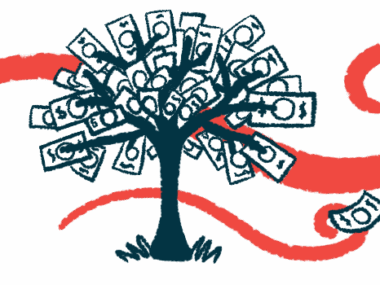Runner to Conquer 7 Scottish ‘Munros’ Each Day for Dad With ALS
Written by |

Joe Crellin runs alongside his father, David Crellin, in his mobility trike. (Photo courtesy of David Crellin)
People affected by amyotrophic lateral sclerosis (ALS) have come up with plenty of creative ways to raise money for research and care — whether it’s the ALS Ice Bucket Challenge, re-creating Olympic events, or Major League Baseball’s designation of June 2 as Lou Gehrig Day.
Joe Crellin, a U.K. ultramarathon runner whose father has ALS, is now joining those ranks: he is running up seven Munros — or mountains in Scotland, each with a height over 3,000 feet (about 915 meters) — every day for a week from Aug. 21–27.
“The fact that no one else has done this specific type of a challenge before makes it not only the kind of catching challenge and good for raising awareness and drawing attention, but it’s also an enjoyable process for me to go through, mapping everything and going through logistics,” Crellin said in a phone interview with ALS News Today.
Crellin, 29, estimates he’ll experience a total of 50,000 feet of elevation gain, which is about 1.75 times the height of Mt. Everest, and 110 miles of climbing, hiking, and running.
Ahead of the event, Crellin has raised more than £10,000 (about $13,650) from individual donors, over £8,000 more than his original goal. The money will be split between the Motor Neuron Disease (MND) Association and My Name’5 Doddie Foundation, which both support ALS research in the U.K.
“It’s just been overwhelming, not just the donations that people have been sending in but all the encouraging messages,” Crellin said. “The lockdown has been an isolating process for a lot of people. This thing helped me and other people just join together in some way and see a positive.”
Crellin’s father, David Crellin, was diagnosed with familial ALS in March 2020. Since the diagnosis, which came at the beginning of the COVID-19 pandemic, David, 63, has begun to lose muscle strength.
Shortly after learning he had the same disease that his mother died from, David, a former civil servant and current volunteer chair at his parish council, walked 19 miles on Isaac’s Tea Trail, a route that winds through the hills and mountains near their home in Northumberland, in northeastern England. He’s now unable to walk.
However, he is hoping to enter a Phase 2 trial (NCT04931862) evaluating WVE-004, Wave Life Sciences’ therapy candidate for ALS patients with C9orF72 mutations, in October at the Sheffield Institute for Translational Neuroscience near Manchester. Two trial sites, in the Netherlands and Canada, are currently recruiting. According to the EU Clinical Trials Register, more sites, like the one David intends to join, will be added pending finalization of the clinical trial contract.
“We are currently bringing sites online globally as the trial just initiated dosing last month,” said a spokesperson for Wave Life Sciences in an emailed statement. “At this time, we are unable to disclose specific details about potential or current clinical trial sites, patient enrollment or timelines beyond what is posted on clinicaltrials.gov.”
David Crellin heard Pamela J. Shaw, MD, director of the Sheffield institute and planned supervising principal investigator for the trial, speak about ALS on the radio and reached out to her via email. After David and Joe visited Shaw in June, she decided to try to add David to the upcoming trial.
Joe Crellin also learned that he carried the same C9orF72 mutation as his father. He had to brace himself for the December test results — there was a 50% chance he would have the mutation, which significantly increases the likelihood of developing ALS.
That discovery has caused him to make minor adjustments to his active lifestyle. He already maintained a pretty healthy diet, but he’s now also focused on more low-intensity, aerobic training after reading a study, for which Shaw is a co-author, that linked intense exercise at a young age to earlier ALS onset.
The study found that frequent and intense physical activity was a risk factor for the development of the disease. Results showed that ALS onset occurred at a younger age in those with C9ORF72 variants who had a history of more physical activity. This link was not found in patients with other disease-causing variants.
Not long after the test, Joe Crellin saw a program on BBC Two, “Rob Burrow: My Year with MND,” that caused him to change these plans and take on a challenge as difficult as running up seven Munros a day.
The documentary, which follows the life of the professional English rugby player Rob Burrow, who was diagnosed with ALS in 2019, showed one of his old teammates running seven marathons in seven days, honoring the number Burrow used to wear.
It inspired Crellin to begin his own journey to raise money for ALS. His first idea was a 550-mile bike ride along England’s sea-to-sea Route 7.
But with limited experience in cycling and having taken up endurance running after graduating from a master’s program at the University of Sheffield with a degree in intercultural communication and international development in 2018, Crellin landed on the Munro idea. Nearly 300 of these mountains are spread across Scotland, which neighbors Northumberland.
Crellin has been preparing in earnest for the challenge, which began on Saturday. A week and a half ago, he took second place in a local ultramarathon, running 38 miles in six hours. Over the recovery week that followed, he ran a total of 45 miles.
“I feel all the energy building up inside of me,” Crellin said. “I’m raring to go.”
He also met with a Munro expert, Steve Kew, to go through the eight routes he has planned (day two includes two routes), throughout the Scottish topography. On the first day, Crellin’s family friend, also an ultramarathon runner, paced him to ensure he wouldn’t exhaust himself straight out of the gate.
David will join his son in summiting the last Munro, a winter skiing site called The Cairnwell, to close out the challenge. He plans to use his off-road mobility trike to go up and down the Munro. He’s blown away by the support he’s had from his son so far.
“I don’t like using the word ‘proud’ because it’s very binary,” David Crellin said. “I use the words ‘astonished,’ ‘amazed,’ and ‘impressed.’”







